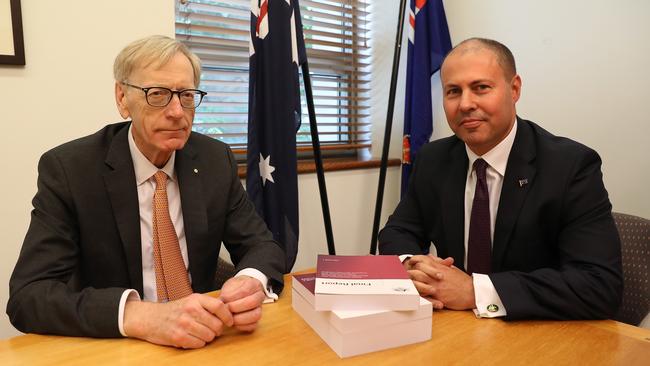Banking royal commission: dignity and distance transform moral rules
Hayne has effectively changed the ground rules for company boards and corporate advisers says ethicist Simon Longstaff.

For a man in his mid-70s who officially retired four years ago, Kenneth Hayne finds himself in the unexpected position of being the man of the moment — if he wants it.
After watching the royal commissioner transform the debate on corporate conduct, ethicist Simon Longstaff believes this former High Court judge will be overwhelmed with invitations to share his views and advice.
“But judging by the look on his face when he was delivering his report, this looks like a man who has a very good sense of the boundaries in terms of his public life and what he wants to do,” says Longstaff, who is executive director of the St James Ethics Centre.
He was referring to Hayne’s extraordinary “Nope” when invited by a photographer to shake the hand of Josh Frydenberg at a staged “photo opportunity”.
“He seems to properly want to maintain that traditional air of disinterested distance that judges bring to bear and he was not going to be mates with anyone that was inconsistent with his former role,” Longstaff said.
Hayne, according to Longstaff, has effectively changed the ground rules for company boards and corporate advisers: black letter compliance is now just the beginning.
Longstaff believes the real lesson from the Hayne inquiry is that corporate lawyers and company directors need to focus on the true spirit of the law instead of using clever lawyering to avoid its substance.
He believes Hayne has tapped in to widespread community dissatisfaction with institutional outcomes and any business that ignores this is heading for trouble.
“Companies that view this as merely a passing moment completely misunderstand the state of the public mind,” Longstaff says.
In retrospect, Anne Twomey of Sydney University was dead right in predicting how Hayne would run this inquiry. On the day he was appointed, Twomey expected him to be “organised and possibly quite brutal in managing the royal commission, which is exactly what you want”.
Hayne came out of retirement for this inquiry after spending 23 years as a judge — more than 17 years on the High Court and more than five years on the Victorian Supreme Court and Court of Appeal. In 2015, when he turned 70 and retired from the High Court, he was replaced by his wife, Michelle Gordon.
They met in 1990 during a major trial when Hayne was at the Victorian Bar and Gordon was his instructing solicitor. In 1995, two years before his appointment to the High Court, Hayne divorced his first wife and married Gordon.




To join the conversation, please log in. Don't have an account? Register
Join the conversation, you are commenting as Logout